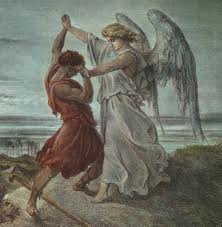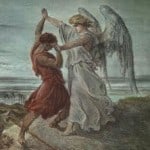Israeli policy has usually been directed by a gnawing fear that has become the subtext of the Jewish psyche, the fear of being alone. Throughout Jewish history the embattled people of Israel have developed conditions and neuroses very similar to victims of abuse. At times, they have begun to blame themselves for the hatred that they have experienced hurled against them. At other times, they have begun to assume that if they would adopt more universal ideals and become more connected to the greater whole they would cease to be persecuted.
As a result of such a desire they have eschewed uniqueness and national identity for the safe anonymity of “sameness” and “being politically correct”. The Divine declaration that Bilaam was forced to pronounce regarding the people of Israel, “A nation that will dwell in solitude .” (Numbers 23:9) began to be seen as a curse. Yet as we know all difficulties and their solutions are rooted in the verses and words of the Torah.
” And he arose during that night, and he took his two wives and his two maidservants and his eleven children, and he crossed the ford of the Yabbok. And he took them and brought them across the stream, and he took across what was his. And Jacob was left alone (Vayivater Yaacov Levado), and a man wrestled with him until the break of dawn.( Genesis 32:23-25)
Immediately following the reality of “And Jacob was left alone” he wrestles with a “man” until the break of dawn. We learn subsequently that this was not just any man, but rather a spiritual being, the angel of death or perhaps the angel of the nation of Esav.
The Bnei Yissaschar understands from this encounter that at critical moments in our individual or corporate spiritual paths we are destined to confront a point of complete aloneness. In such times we are thrust into situations wherein we are left disconnected from our environment, our past, our destiny. We are simply left with ourselves equipped only with our delicate balance of strengths and weaknesses. It is in that struggle that we find the empowerment to move forward.
Jacob came into this encounter filled with much concerns, insecurity and fears. He expresses these in his prayer to Hashem ;”I am unworthy of the least of all the mercies and of all the truth which You have shown Your servant,”( ibid 32:11)
On a deeper level one almost senses that the painful words of his father, Isaac, seared a deep wound in Jacob’s heart. Those were the words Isaac said when giving Jacob the blessings that ostensibly were for Esav;”The voice is the voice of Jacob, but the hands are the hands of Esau.'”( Genesis 27:22).
Jacob was aware that what he did regarding the blessings was clearly within the desire of G-d. Yet Jacob may have been deeply troubled by the gnawing question of how much of Esav’s character had seeped into his soul. Had “the hands of Esav” overtaken the spiritual “voice of Jacob”.
It is then that he is thrust into this place of aloneness .It is only in that solitude that he would have the opportunity to struggle with those fears to determine if indeed he was still on the path that G-d had decreed for him.
Jacob was neither the first nor the last of his people that would need to learn the power of solitude. Abraham was called a Hebrew Ivri because when the whole world was on one side of the river, he had the courage to cross over ( La-Avor) and stand alone on the other side. Bilaam against his will was belessing the people and not cursing them when he declared that this people will be a “A nation that will dwell in solitude and not be reckoned among the nations.” (Numbers 23:9).
When the people of Israel will lose their spiritual way, we read how the prophet Hoshea describes G-d telling them”Therefore, behold, I will allure her, and bring her into the wilderness, and speak tenderly unto her ( Hoshea 2:16).
It is in that wilderness and solitude that “the tender call of Hashem” can be heard .It is in their aloneness that they will find the strength to continue on their journey into destiny.
The Jewish people are then left with two choices. They can view “A nation that will dwell in solitude” as a curse and will do all that they can to escape their unique role. On the other hand they can understand it as an opportunity to in fact hear that “the tender call of Hashem” .When that happens then we will see the fulfillment of the verse “The haughty eyes of man will be humbled, and the height of men shall be bowed down, and Hashem alone shall be exalted on that day (nisgav Hashem livado). ( Isaiah 2:11)

